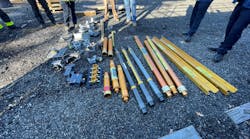July 13--Nearly 70 years ago, a sharecropper named Ansel James rescued Grover Mackey after he became trapped in a 50-foot-deep well on a farm near Salley. For his brave effort, James received a bronze medal from the Carnegie Hero Fund Commission.
Phillip Frazier, James' great-great-grandson, doesn't want his courageous relative to be forgotten. Next month he will travel from his home in Washington, D.C., to the town of Norway in Orangeburg County. While there, Frazier will place a replica of the medal on James' tombstone in the graveyard of New Beginning United Methodist Church.
"This is a way to keep his memory alive for the people in the area," said Frazier, who doesn't know what happened to James' original medal. "It also will help foster a link of continuity among the members of our family."
Frazier, 41, is an educator who works for Dorothy I. Height Community Academy Public Charter Schools. He has been doing research on his kinfolk and their ties to the Palmetto State for more than 20 years.
"I was always fascinated with my great-great-grandfather because I thought his first name was so unusual," Frazier said. "The only other person that I was familiar with that had the same name was the photographer Ansel Adams."
During a trip to Salley for a wedding, Frazier learned about James' daring deed from a cousin, and he decided to try to find out more about it.
Frazier visited the Library of Congress, where a staff member helped him find an article in the Baltimore Afro-American newspaper that mentioned James being honored for his valiant act. Frazier then contacted the Carnegie Commission, which verified the story and gave him detailed information about James' role in Mackey's rescue.
Later, Frazier read in a Carnegie Commission newsletter about how the families of people who had received Carnegie medals could get replicas of the awards to place on graves.
"I emailed the commission requesting a medal, and they sent it to me," Frazier said. "They also sent me some sort of adhesive to attach it."
James' heroic feat took place on Feb. 16, 1945. Mackey, who had been hired to clean the well, was at its bottom in the afternoon when wooden boards supporting the walls broke. Sliding sand covered Mackey up to his armpits.
Attempts to raise Mackey using first a rope and then a leather plowline failed as a crowd of about 20 people gathered to watch. Nobody wanted to go down into the well, so someone went to get James.
To supplement the income he earned as a tenant farmer, James, who was in his 60s, dug and cleaned wells. Six months previously, he had been working in the well where Mackey was trapped and had noticed there were boards that were rotting.
Even though James knew it would be dangerous, he agreed to try to get Mackey out. After arriving at the well in the early evening with his own windlass and a short-handled shovel, James took off his shoes and sat astride a bucket that was tied to a rope while it was lowered into the well. In addition to the shovel, he carried a lighted lantern that Porter had provided.
After reaching Mackey, James asked for two new boards to be sent down into the well.
When he got them, he stabilized the collapsed side with the pieces of wood. James then worked for several hours to free Mackey, shoveling sand into the bucket and sending it to the top of the well over and over again.
When enough sand had been removed to uncover Mackey down to his knees, James scooped away more of the water-soaked material with his hands. Taking his pocketknife, James cut Mackey's shoelaces, clasped him beneath the arms and pulled him up, liberating the man's feet from his stuck shoes.
James then lifted Mackey onto the bucket, and he was hauled out of the well.
Maggie George, who was the Aiken Standard and Review's Salley correspondent at the time, notified the Carnegie Commission about what James had done, and he received a medal along with $500 to buy a house or make another purchase approved by the Carnegie Commission's executive committee.
James died in November 1947 after suffering a stroke.
A story in the Aiken Standard and Review following James' death described him as "a good citizen and industrious worker, and a real gentleman of another era."
Dede Biles is a general assignment reporter for the Aiken Standard and has been with the newspaper since January 2013.
,
Copyright 2014 - Aiken Standard, S.C.





